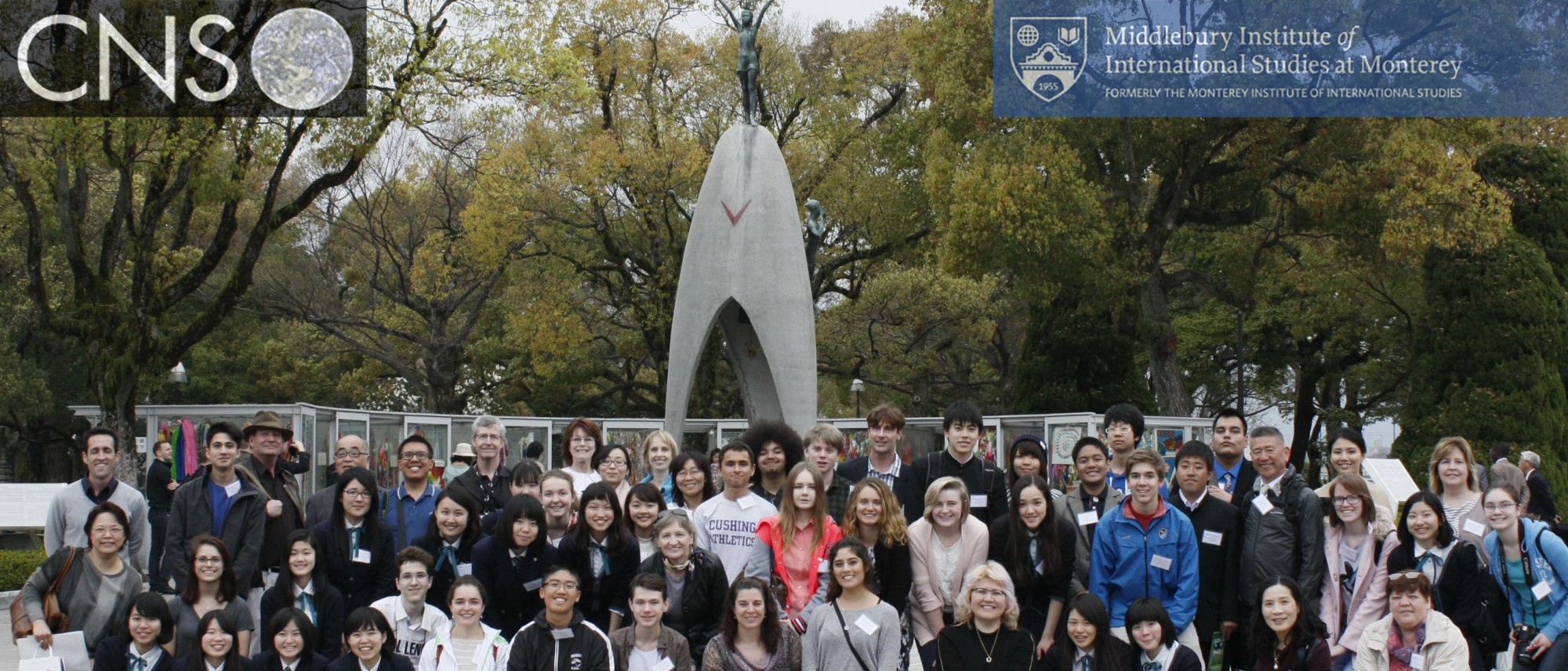2016-17 Critical Issues Forum Focuses on CTBT
By Masako Toki
The 2016-17 Critical Issues Forum (CIF) kicked off with an online teachers’ workshop at the end of November. This year’s topic, “Comprehensive Nuclear-Test-Ban Treaty (CTBT) and its Role for a World Free of Nuclear Weapons,” is particularly timely as 2016 marks the twentieth anniversary of the treaty’s opening for signature.
For nearly twenty years, CIF, a flagship education project of the James Martin Center for Nonproliferation Studies (CNS) at the Middlebury Institute of International Studies at Monterey (MIIS), has effectively promoted awareness of disarmament and nonproliferation, reaching thousands of high school students and teachers around the world.
Under this theme, participants study nuclear weapon-testing history and efforts to prevent such testing. Students examine the CTBT negotiations, the treaty’s current status, challenges, and prospects. They also investigate how the CTBT, once in force, can accelerate efforts toward a world free of nuclear weapons.
The CIF’s course of study is divided into four content domains: scientific/environmental, social/cultural, economic, and political /geopolitical. Students study the basic scientific aspects of nuclear weapons, the effects of their use, and the concepts behind the CTBT verification regime. Students will also debate whether weapons that are illegal to test should also be illegal to possess, and investigate various views on obtaining the peace and security of a world free of nuclear weapons.
To understand and examine these challenges and prospects, it is important for CIF students to study the status of current world arsenals of nuclear weapons, various proliferation threats, and the global nonproliferation regime, including states’ policies toward nuclear nonproliferation and disarmament. Based on these investigations, students will derive their own ideas for how to bring the CTBT into force, and assess how the CTBT contributes to the goals of peace and security of a world free of nuclear weapons.
Teachers from Japan, Russia’s closed nuclear cities, and the United States participated in the online workshop. Participants engaged both synchronously with the online workshops and asynchronously, at a later, more convenient for them, given time differences. All workshop sessions were recorded and remain available on the CIF website for asynchronous viewing.
CNS Deputy Director Elena Sokova gave welcoming remarks, congratulating the CIF teachers for their important work in disarmament and nonproliferation education for the next generations. Touching upon a brief history of nuclear-weapon testing, she emphasized the important roles for youth in disarmament and nonproliferation.
This year, CNS welcomed a special guest speaker for the teachers workshop, Mr. Jean duPreez, whose extensive experience in disarmament and nonproliferation diplomacy includes serving as the CTBT Organization’s chief of the external relations and international cooperation section from 2009 to 2016.
Mr. duPreez gave the following four lectures related to nuclear testing and nuclear disarmament:
- History of Nuclear Testing, Nuclear Testing, and the Cold War
- CTBT Negotiating History and the Creation of the CTBT Organization
- Technical dimensions of CTBT: International Monitoring System, International Data Centre, and On-Site Inspections
- The role of the CTBT in the Nuclear Nonproliferation and Disarmament Regime: Current Challenges and Future Prospects.
The participants benefit from Mr. duPreez’s first-hand experience with how the organization works, the importance of the verification regime, and the challenges and prospects of the treaty’s entry into force.
Mr. duPreez suggested that students investigate how and whether the eight countries (China, Egypt, India, Iran, Israel, North Korea, Pakistan, and the United States) that have not ratified the treaty will do so and how the international community facilitates its entry into force.
Other lectures covered global nonproliferation regimes, the current world status of nuclear weapons, the basics of nuclear weapons, recent disarmament initiatives, and North Korea’s nuclear-weapon program. In addition, two of the CTBTO Youth Initiative members shared their experience and encouraged high school students to get involved in discussions related nuclear disarmament and nonproliferation in various ways as future leaders.
For the complete lecture video and presentations, visit the CIF website’s teachers’ workshop page: http://sites.miis.edu/criticalissuesforum/2016-2017-teachers-lectures-and-presentations/
After the teachers complete their studies on these topics using the online materials, they will work with the students at their own schools toward the Spring Conference that will be held in Nagasaki, Japan, in April.
This will be the first time for the CIF to hold the students’ conference in Nagasaki, and the second time it will be held in Japan, following the 2015 Hiroshima Conference. Holding the students conference in Nagasaki, the second city to have experienced nuclear devastation, is significant in many ways. Participants can learn the real impact of the use of nuclear weapons against humanity. Furthermore, by gathering in Nagasaki, CIF students will strengthen their determination to make the city the last to have experienced nuclear devastation, and to work for a world free of nuclear weapons.
CNS is grateful to the United States-Japan Foundation and the Tom and Sarah Pattison Fund for their support of CIF.
For more information, please visit CIF website at http://sites.miis.edu/criticalissuesforum



